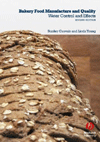State of the Industry 2024: Bakers continue to show resilience and creativity
Challenges might persist, but so do bakery producers, showing resilience and creativity.

For U.S. consumers, grocery shopping continues to be a somewhat stressful ordeal. With inflation continuing to elevate prices for basic goods like flour, sugar, loaves of bread, and other staples, they are having to make some tough choices when filling their carts (whether in the store or digital).
Fortunately for the producers that read Snack Food & Wholesale Bakery on a regular basis, consumers continue to choose bakery goods. True, they are perhaps spending less on some items than they did pre-pandemic and before the current skyrocketing food costs, but most bakery categories included in this year’s State of the Industry: Bakery coverage held steady or dropped only slightly—and some subcategories and producers saw increases in dollar sales worth celebrating—thanks to the innovation, ingenuity, and resilience shown by professionals in the field.
To gain a deeper perspective on the challenges and opportunities impacting the baking industry, SF&WB checked in with two experts from the American Bakers Association (ABA):
- Eric Dell, president and CEO
- Rasma Zvaners, vice president, government relations
Common challenges
Dell remarks that throughout 2023, ABA looked for ways to help its members identify and overcome obstacles. He was once again impressed by the resilience bakers showed, and their innovative approach to dealing with persistent issues. For example, he says, bakers continue to dive into emerging technologies and put them to good use in their operations.
“What we're seeing in terms of automation, and AI, shows how the industry is really rapidly changing to meet the demands of the future and the demands of today as well,” he says. “Tapping into those emerging technologies is something that we've seen throughout the year. Obviously, that's part of our strategic plan and trying to assist our members in that space in highlighting what they're doing in that space.”
Dell also reports observing that the industry’s leaders show willingness to work together, collaborate on furthering the entire field, in a way that often makes friends out of competitors, and serve as valuable members of their communities.
“When I came into the industry and started working with ABA and learning more and more about the industry, I was just happily surprised at how much the baking industry gives back to the communities in which they work, live, and play,” he states. “We're not telling that story a lot and enough, so we'll continue to do that.”
Zvaners says in addition to wrangling with woes like inflation, labor challenges, and other obstacles, bakers have exhibited increasing dissatisfaction with policymakers’ action (or in some cases, the lack thereof).
“There's been greater frustration in some camps that the federal process may not be working as we look at Congress, but also some of other agencies, that they don't move often as quickly as some would like,” she says. “I think there's been a much greater emphasis on states stepping into that space and becoming more vocal on introducing different types of legislation.”
Common Solutions
In terms of legislation to continue watching out for through the end of 2024, Zvaners mentions laws and regulations impacting packaging, ingredients ban (such as state proposals inspired by California’s), and regulatory discussion around per- and polyfluoroalkyl substances (PFAS). As such legislation and discussions develop throughout the year, she adds, ABA will continue working to engage and impact leaders on the topics relevant to bakers.
Zvaners also remarks that as current obstacles continue to vex the industry, bakers working together on common challenges will be an important part of the solutions.

“One of the amazing resources that we have is we have a series of professional groups; they have evolved over time, and they cover a variety of issues—everything from workforce issues to OSHA safety requirements, our food technical regulatory affairs experts that deal with everything that's food safety and nutrition policy related, we have our energy and environment folks, we have a logistics group, we have our commodity and agricultural policy group, and we also have a legal group,” she shares. “Last year coming out of transitions, both within the association but also post-COVID, it's a different dynamic than what it used to be, but we still provide opportunities for those members to come together in a virtual space.”
The annual ABA convention (the 2024 edition of which took place in Arizona in April)—like conventions held by the American Society of Baking (ASB), Baking Equipment Manufacturers and Allieds (BEMA), and other industry associations—offers a chance for industry leaders, suppliers, and other stakeholders to gather and share what’s on their mind, be it pressing problems, useful resources, and future concerns. Dell says the conventions and other events provide the industry with a wealth of benefits.
“In my opinion, the top values, advocacy, networking, and research/education—those are the primary drivers of value,” he shares. “Our networking was just phenomenal throughout the year at the different events that we held, partnering on the Nexus event, partnering on our NextGen baker work that we did, and then working through those in-person fly in, making some more events in-person to help with networking.”
What’s more, Dell shares, groups like ABA can help guide bakers on better understanding their customers, which can prove invaluable in planning and adjusting their product offerings for greater success.
“On the consumer trends side, bakers are always trying to find out what consumers are looking for, and where the trends are going with what consumers are looking for,” he remarks. “I think we stepped up our game beginning last year and really rolling into 2024 with the recently announced playbook that we did by sector of the economy.”
Zvaners muses that while the road ahead might be paved with uncertainty, she predicts members of the baking industry will continue working together, and that ABA will continue supporting them.
“Even as I look to 2025 and see potential changes in leadership in Washington D.C and some of the things that are happening at the state level ramping up a bit more, I don't doubt that our members will be able to work with us, through us, and our partnerships with other associations to help further their outcomes so that we can be better supportive of the entire commercial baking industry,” she says.
Dell also says with labor shortages continuing to plague bakery and other manufacturing-centric sectors, providing bakery professionals with resources to help alleviate such headaches is vital. Also, he remarks, the increasingly close working relationship among bakery organizations and associations is a plus for the entire industry.
“We can help our members—and we did this in 2023—through increased partnerships, like working with the Grain Foods Foundation on issues that impact the industry, working with ASB, working with BEMA,” he states. Bringing the industry together more and working closely together in partnership helps our members at the end of the day.”Looking for a reprint of this article?
From high-res PDFs to custom plaques, order your copy today!









